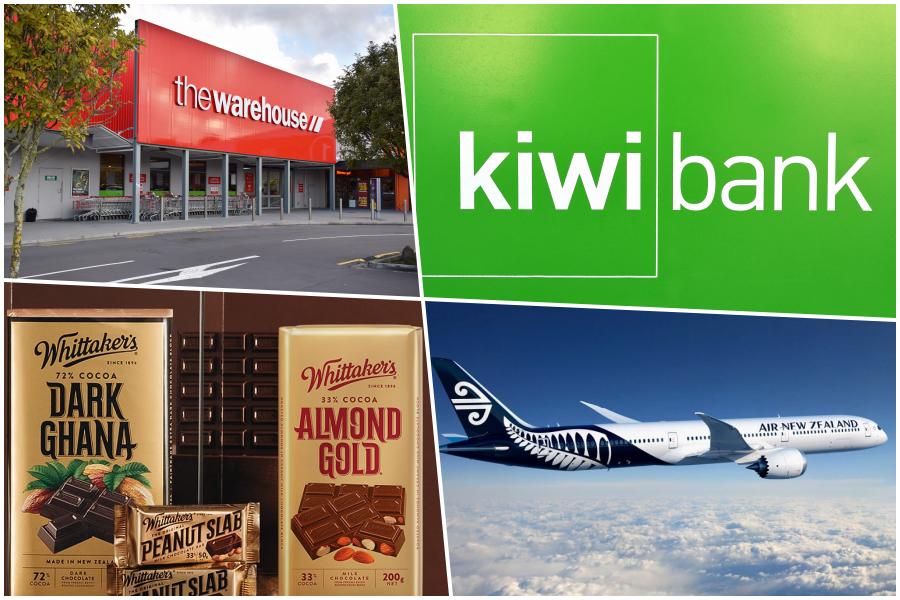NEW ZEALAND's STRONGEST LOCAL BRANDS
New Zealand consumers are uncommonly aware of which brands are homegrown. They're also well in tune, especially this year, with which ones are supporting the community and which ones are falling short.
As part of our Asia's Top 1000 Brands research, from which we generate both the Asia-wide top 1000 list and a top 100 list for each market (such as New Zealand), we ask survey respondents an additional question about the strongest local brands in their markets (see the exact text of the question below). Because the question is open-ended, we often see MNC brands mixed in among the true local ones in the results. But in New Zealand, this doesn't happen.
We asked: "What do you think is the strongest local brand in New Zealand? By ‘strongest local brand’ we mean a brand that originates from Korea, has the best reputation and resonates most strongly with those living in this market".
The top 10 local brands mentioned:
- Air new zealand
- Whittaker
- The Warehouse
- Fonterra
- Watties
- PaknSave
- Fisher & Paykel
- Kiwibank
- Anchor
- Sanitarium
The shifts visible in the strongest brands list this year, underscore how well citizens are paying attention, not just to which brands hail from New Zealand, but to the actions they're taking.
"There is a definite move to supporting local businesses wherever possible," says Isobel Kerr-Newell, MD of MSL in New Zealand. "While there will always be a role for international brands in Kiwi consumers' lives, many New Zealanders are becoming more mindful in their purchasing."
But it's not enough to just be a local brand. You have to show up.
"The [brands] on my radar are the ones who have gone above and beyond during Covid-19 disruptions," says Tony Bradbourne, CEO and CCO at independent agency Special Group. "The brands who have changed their messages to be topical and understanding. And the brands that have been generous. These are the brands that have become more popular this year."
For example, take this year's top three strongest local brands. The Warehouse, last year's top brand on this list, fell to third. The company made a perception-damaging misstep at the very start of the country's first lockdown period. It declared it would be open as an 'essential' business, which led to a bump in its stock price. However, it turned out the government had not actually decided whether The Warehouse qualified for that status. The retailer, which has been struggling in any case due to competition, took a further hit in the public eye later, when it announced significant redundancies during the pandemic.
"Consumers want businesses to put their staff first and profits second," says Claire Beatson, general manager of group strategy for Dentsu Aegis Network New Zealand. "While staff reductions are present across all industries, the ways in which The Warehouse cut staff were deemed as being too aggressive and unnecessary. Resulting in a bad backlash."
Another observer told Campaign New Zealanders saw these actions as a "betrayal".
Conversely, consider Kiwibank, which didn't place among the top 10 last year but appears at eighth this time.
"The banking industry on the whole moved quickly to support New Zealanders through this time, with almost all offering mortgage relief and customer communications encouraging anyone experiencing financial hardship as a result of Covid to get in touch with them to see how they could help," says Kerr-Newell. "Perhaps with the general uncertainty in the global financial markets, New Zealanders became more mindful of where their money was held—which could explain the prominence of Kiwibank in this year’s rankings."
Beatson says part of Kiwibank's success has been due to its choice to focus strongly on the mental as well as financial health of the people in its community. For example, the company has been a major supporter of a mental-health focused app called Mentemia.
"There is a trend of hyper local and supporting local communities and brands," says Caleb Watson, regional managing partner at Initiative, who is based in Shanghai but is a New Zealand native. "However, also important to consumers are those brands that best understand them and needs. How those brands connect and provide value in their lives. It enables brands that are big or small, from local or international, to compete for consumer loyalty and interest."
Food brands make up the bulk of the strongest-brands list, with Whittaker, Fonterra, Watties, PaknSave and Sanitarium all ranking higher than they did last year. Many of these bumps are likely due to community-minded actions, such as Watties' efforts to step up production to meet huge demand and Sanitarium's massive donations during the pandemic.
The No. 1 strongest local brand, Air New Zealand, presents something of a conundrum. Despite its top spot here, Air New Zealand didn't make the list of New Zealand's top 100 brands this year, or last year, even though a number of airlines based outside of New Zealand did (see "New Zealand's top 100 brands: The pandemic hierarchy of needs").
The top 100 ranking is based on asking respondents to name the best brands (regardless of headquarters) in a given category. So perhaps the larger international carriers just come to mind more readily.
Yet Air New Zealand's position of pride in the hearts of citizens is undeniable. One observer we talked to says it "isn’t so much an airline as it is a national treasure", while another admits getting emotional seeing the brand's 80th birthday TVC earlier this year (see below), calling it "a powerful reminder of their deep connection to this country".


